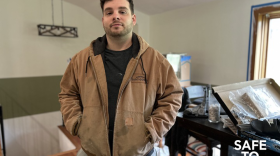Thursday marks the restart of widespread testing for PFAS chemicals in New Hampshire’s public water supplies, after a year-long delay due to a lawsuit from PFAS-maker 3M.
PFAS are industrial chemicals, widely found in groundwater and linked to health problems including liver and kidney disease, high cholesterol and reproductive, developmental and immune issues, as well as potentially some cancers.
Get stories like this in your inbox - sign up for NHPR's Rundown newsletter here.
The chemicals were common until at least the early 2000s in many household products, but aren't subject to binding federally regulations. New Hampshire is one of a small but growing number of states with its own PFAS limits.
The state Department of Environmental Services briefly enacted these new rules last year, before a judge granted an injunction that halted enforcement. This summer, the state legislature re-authorized the limits itself and put an end to the court case.
Starting Thursday, public water systems of all sizes, as well as schools, will have to test on a quarterly basis for four kinds of PFAS in their water supply.
If their average levels over four consecutive quarters exceed any the state's limits, which are some of the strictest in the country, they could have to invest millions of dollars in treatment technology or new water sources.
Brandon Kernan, the head of the DES Drinking Water Bureau, told NHPR that voluntary sampling from 2016 to 2019 showed close to 200,000 people affected by PFAS contamination.
It means contamination was present at one time in 7% of water systems, serving more than a quarter of public water users in the state. The state says this rate is comparable to a naturally occurring contaminant.
Kernan said in an email that many systems have since addressed the issue: “in many cases the source of water has been taken offline, blended with another source to reduce PFAS levels or had treatment installed.”

Several hundred systems also conducted tests at the end of 2019 to comply with the new limits before the court injunction took effect. Most were small housing developments and schools, along with some larger systems.
Kernan said data on those tests compiled in March showed excessive PFAS levels in about 5% of systems.
The state says it will offer water systems a waiver to use that fourth-quarter 2019 data as part of their average results over the next year.
Jason Randall is the superintendent of the Plymouth Village Water and Sewer District, one of the plaintiffs recruited by 3M to join the lawsuit that delayed the rules last year. He told NHPR in an interview that Plymouth did not test for PFAS at the end of 2019, but will begin doing so this quarter.
Randall is still concerned that the new PFAS limits and others planned in the next few years will create uncertainty for water ratepayers. He calls the cost of testing “an expense up and coming” for Plymouth, and says the cost of any potential treatment “is still an unknown at this point.”
The state is in the process of launching a new $50 million low-interest loan fund to help systems comply with the rules. Other sources, like federally-backed drinking water revolving loans and the state Drinking Water and Groundwater Trust Fund, could also be used.
New Hampshire is also part of a huge lawsuit against PFAS manufacturers like 3M and DuPont. Similar suits have netted hundreds of millions of dollars for contaminated areas in the past. New Hampshire will augment the new loan fund with any settlement it may eventually receive.
Support NHPR's award-winning local news reporting - become an NHPR member today.








